Faculty Senate | Senators
2023-24 Faculty Senate
Current Faculty Senate membership (link to spreadsheet)
Past Faculty Senate membership (link to Google Folder)
Current Faculty Senate membership (link to spreadsheet)
Past Faculty Senate membership (link to Google Folder)
The Faculty Senate at the University of Minnesota comprises of faculty and eligible academic professional representatives from the UMD, UMM, UMR, and UMTC campuses and concerns itself with faculty welfare, educational, and research matters.
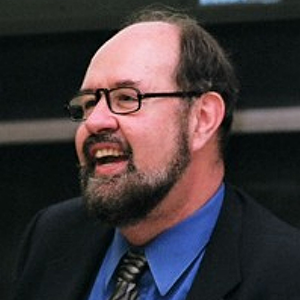
Beeman completed his undergraduate work in anthropology at Wesleyan University, and then went on to a Master’s and PhD at the University of Chicago. While doing doctoral work on discourse analysis in Iran, Beeman became interested in traditional performing arts in Asia. Eventually, this led to an unusual path in his career: although he was already tenured faculty at Brown University, he felt that he lacked an “insider’s” view of performing arts, and decided to attend the Boston Conservatory to study vocal performance. He later spent three years performing as an operatic bass in Germany.
In addition to serving as chair of the anthropology department, Professor Beeman maintains faculty affiliations with the Center for Cognitive Sciences and the program in Second Language Studies. He is a world-renowned expert on the Middle East, the Gulf Region, and Central Asia and has published dozens of works on myriad subjects, such as Iranian performance traditions, the neurobiology of opera, and language and identity politics. He served for several years as the secretary of the American Association of University Professors (AAUP), and the president of the Middle East Section of the American Anthropological Association. He also speaks over ten languages, including Hindi, Turkish, Bengali, and several European languages.
As with so many other aspects of his career, Beeman demonstrates an enthusiasm for governance that is contagious. He first got involved in governance at Brown University, where he served on the Faculty Executive Committee from 2001-2004. At the University of Minnesota, he served on the Faculty Senate from 2007 to 2013, as well as on the Senate Committee on Faculty Affairs (SCFA) from 2011 to 2013. He is currently serving his second term on the Faculty Senate, from 2014-2017. Known for being unafraid to voice a dissenting opinion, he believes in shared governance because he feels that proper consultation, cooperation and transparency are critical, as is faculty input.
When I ask him what he does in his spare time, he half-jokes that between his duties as professor and department chair and his governance participation, spare time is somewhat elusive. Nevertheless, Beeman continues his singing career, and has also written, directed and produced various plays. Recently, in conjunction with the University of Minnesota Department of Theater Arts and Dance and the Elemental Ensemble, he directed and produced a reading of It Can't Happen Here, a play written in 1936 by Sinclair Lewis and John C. Moffitt, which explores life in the U.S. under an authoritarian leader elected on a populist platform.
— Amber Bathke
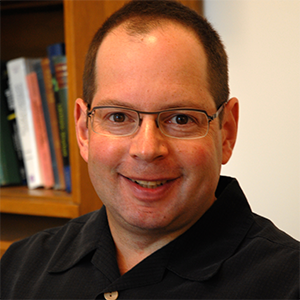
Leo, who grew up in upstate New York, worked himself through the ranks of the faculty at the University starting as an assistant professor in the fall of 1988. His research focused on advanced materials, or more precisely (in layman’s terms), “how different materials blend together to form new materials.” Though offered a position in a government research lab, Leo chose the diversity of academia over a pure research career. He always wanted to work at a Big Ten university, or something comparable to a Big Ten university, because he “like(s) the fact that we are really trying to educate the people in the state and surrounding states. And being at a big school allows us to do different things.” One of those different things for Leo has been participating in shared governance.
Leo served as a representative in the Faculty Senate from 1995-1998. He first began committee work – which he finds more fruitful - in 2002 on the Faculty Academic Oversight Committee for Intercollegiate Athletics (FAOCIA). “Art Erdman from Mechanical Engineering knew I golfed. That was athletic enough [for me] to be appointed,” he quipped. Leo currently serves as Faculty Athletics Representative to the Big Ten and NCAA. In this role he also serves on the Advisory Committee on Athletics and (again) on the FAOCIA. Additionally, he serves on the ROTC subcommittee and has served on the Committee on Committees (with one term as chair).
The moment that Leo felt the most satisfied with his contribution to Senate work was in his initial years on the FAOCIA, soon after the basketball program scandal in 1999. Through the actions of committees, the Senate was able to move the pendulum back to assure the “relationship between the athletic departments and academic departments was a good one” while maintaining necessary firewalls between the two. He added that Senate action assured a level of academic integrity that has maintained to this day.
Leo is one of the small handful of seasoned faculty whose continued participation contributes to the institutional memory that serves committee work so well. As he said, he’s not looking to build his resume at this point. He, and other long-serving faculty, truly have the good of the institution at heart. But Leo also believes that more faculty should participate, so that we don’t hear from the same voices year after year. Leo considers it “integral that new faculty are included and recognized in governance, so that it continues to work as well as it has for so many years.”
In other words, Leo has fully embraced the traditional idea of a university: a place where all participants are engaged not only in learning, but also in active discussion and decision-making regarding the direction the institution should take. Sacrificing a serviceable handicap is worth it for him. But his involvement in shared governance is not solely altruistic. He also said that “it’s fun to get to know faculty from outside my department and college. This is and has been the best part of governance.”
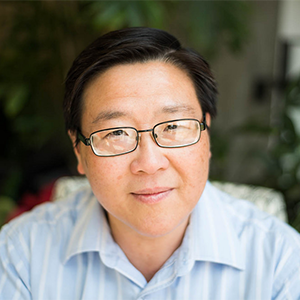
In Ng’s view, she was a part of University governance from day one. Every faculty at UMM is a part of the campus assembly, the campuswide governance body. And, Ng adds, “UM-Morris is a very egalitarian campus, and so technically, I became involved in shared governance when I started as a regular faculty.”
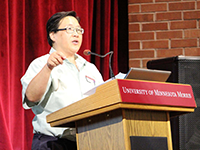
Ng admits that when she was a brand new faculty, she was very naive. “I had some weird notion that college administrators made lousy professors,” she says. A few years years later, a chief administrator retired and there was some shuffling of campus leadership. Several faculty, including Ng, were asked to take on administrative duties as part of their appointments. Ng asked her then boss, “Why do you take all these award winning and excellent teachers from the classroom and make them administrators?”
The response was, “Would you rather I choose lousy teachers to lead academic affairs?” That, Ng says, changed her perspective and stereotype of administrators. In turn, Ng says she has learned much by being on systemwide committees and considers herself lucky to be able to serve. “I am a better faculty and a more mindful academic administrator for having served on systemwide shared governance,” she says. Ng says when a solution presents itself or is arrived at, she asks if that solution solves more problems than it creates.
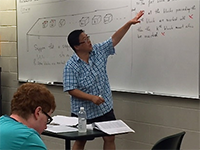
An essential skill, Ng notes, and one that she continues to hone, is learning how to balance the “Big Picture” and the detailed ramifications of policies. She said, “Finding a healthy balance between being consultative and moving forward is also another key to how I usually approach governance.”